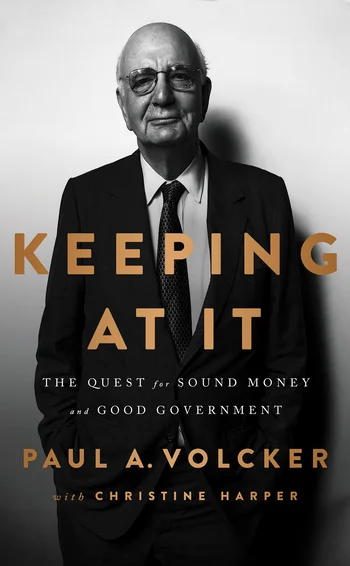
Book notes: Keeping at it, by Paul Volcker with Christine Harper
Volcker delivers fascinating history-laden memoir, writes Jean-Claude Trichet

Paul Volcker with Christine Harper, Keeping at it: the quest for sound money and good government, PublicAffairs, 2018, 304 pages
Paul Volcker’s latest (and possibly his last) book is remarkable both in scope, covering his entire professional career, and in depth, discussing the lessons learned and problems faced by the author in both the US as well as all advanced economies and societies around the world.
Having myself chaired the Group of 10 meeting and the Global Economy Meeting of central banks in Basel from 2003 to 2011, I know Paul Volcker was and still is considered an iconic, exemplary central banker by his international colleagues.
He was the chairman of the US Federal Reserve who succeeded in mastering inflation in the 1980s. It took a lot of lucidity, determination and courage to control inflation in that environment at the time. Volcker also presided over the reintroduction of price stability as a key feature of the US economy, which was also a global event by way of consequence, triggering a disinflation process in many other economies.
This memoir sets out key lessons learned during decades of public service. The bottom line is: price stability, sound finance and good government – Volcker’s exemplary three principles. A testament to his work, and arguably his legacy, is the continued stability of prices in many parts of the world – which highlights Volcker’s extraordinary capacity to change the long-term course of events – especially so, given that he stepped down as head of the Fed more than three decades ago. Unfortunately, one cannot say sound finance and good government are present in the US and many other advanced economies today. This book sends a strong signal to all democracies and their executive and legislative branches about the need to redress this alarming state of affairs.
Volcker is positive on the US strategy in the 1950s, with its support of Europe’s economic recovery, open global trade and open investment. This strategy, he writes, resulted in unprecedented gains in the human condition, including a healthier and wealthier growing population all over the world. But he is far from flattering about the mistakes that succeeded such prosperity: unnecessary wars; absence of recognition of the costs of open markets; the burden of technological change; and the naive belief in the capacity of financial markets to discipline themselves. He is even more negative towards the present situation, summarising that the allies of the US are perplexed and are questioning the US’s leadership. The spreading of democracy and the rule of law are in great danger.
Volcker’s book is a historical narrative, written by a man who made history. All of its chapters are fascinating. I was particularly impressed by what is said during the crucial moment when the US decided to abandon the Bretton Woods system. We penetrate the inner circle of the US Treasury, with Volcker being undersecretary of the Treasury for monetary affairs, and David Kennedy secretary of the Treasury. We are transported to the heart of the debate on whether or not to abandon the system. Milton Friedman is advocating loudly to leave it. Bob Roosa recommends sticking to the order embodied in the agreement, arguing experiences in the 1930s had demonstrated the instability that floating exchange rates could create.
After a lot of discussion in the so-called Volcker Group (which was set up by Henry Kissinger at the very beginning of the Richard Nixon presidency), Volcker becomes convinced the situation is untenable and writes a long memo outlining the approach he would propose taking. He writes that he would: first, suspend gold’s convertibility to the dollar; second, negotiate new exchange rate values; and third, “reform” the international monetary system to “reinvigorate” the Bretton Woods system.
Volcker’s book is a historical narrative, written by a man who made history. All of its chapters are fascinating … We are transported to the heart of the debate on whether or not to abandon the Bretton Woods system
Volcker is torn between, on the one hand, the reality of a situation that was deteriorating by the day – leading him to recommend his first point – and his strong trust in the necessity of international monetary order. He quoted Bill Safire’s own memoir: “He [Paul Volcker] was schooled in the international monetary system, almost bred to defend it; the Bretton Woods agreement was sacrosanct to him.”
He was deeply frustrated when it was decided the conversion of gold should be suspended but was not followed by a reform of the international financial system, despite all his efforts, including meetings with great minds such as George Shultz. The new secretary of the Treasury was presented with Volcker’s proposals for a reformed monetary system, which centred on specified central exchange rate values. But countries involved in the negotiations could not reach an agreement. Reform was dead – and it still is!
Another fascinating chapter of the book deals with the decision-making process within the Fed towards attacking inflation. In September 1979, the Fed’s board voted 4-3 to raise interest rates. From Volcker’s perspective, as the newly elected Fed chairman, this was a clear-cut majority. Market participants, however, viewed the Fed as divided, and prices reacted negatively, putting into question the credibility of future interest rate increases. It was one of the reasons why Volcker decided to change the concept of monetary policy and to direct it explicitly toward restraining the growth of money.
Volcker’s determination during this period was extraordinary. The Fed was not supported by anybody. A large number of complaints came from the real economy. Mainstream economists aggressively criticised the Fed’s decisions. Even the monetarists led by Friedman were negative. President Jimmy Carter himself deemed the Fed’s decision to focus on the money supply “ill-advised”.
It is fascinating to see Volcker’s blend of inflexible determination in attacking inflation and high degree of pragmatism in choosing the most appropriate tool to reach his goal. He sums up his approach in qualifying the monetary policy concept of the Fed as “tactics”. It was a tactical move to adopt a money supply policy. It was tactical to abandon it later on. “I emphasised that our basic anti-inflation policy hadn’t changed; it was a matter of tactics. The substantial declines in the inflation rate enabled us to credibly change tactics while maintaining policy,” writes Volcker.
Keeping at it is a wonderful book – a bedside book to read, to reflect on and to meditate on. More than ever, Volcker’s three principles – price stability, sound finance and good government – are of the utmost importance. Lucidity, determination, integrity and courage are his personal marks. On top of that, I note his qualities of affability, kindness and generosity, which are legendary, are present throughout his memoirs.
Only users who have a paid subscription or are part of a corporate subscription are able to print or copy content.
To access these options, along with all other subscription benefits, please contact info@centralbanking.com or view our subscription options here: http://subscriptions.centralbanking.com/subscribe
You are currently unable to print this content. Please contact info@centralbanking.com to find out more.
You are currently unable to copy this content. Please contact info@centralbanking.com to find out more.
Copyright Infopro Digital Limited. All rights reserved.
You may share this content using our article tools. Printing this content is for the sole use of the Authorised User (named subscriber), as outlined in our terms and conditions - https://www.infopro-insight.com/terms-conditions/insight-subscriptions/
If you would like to purchase additional rights please email info@centralbanking.com
Copyright Infopro Digital Limited. All rights reserved.
You may share this content using our article tools. Copying this content is for the sole use of the Authorised User (named subscriber), as outlined in our terms and conditions - https://www.infopro-insight.com/terms-conditions/insight-subscriptions/
If you would like to purchase additional rights please email info@centralbanking.com
Most read
- ECB says iPhone is currently incompatible with digital euro
- Supervisors grapple with the smaller bank dilemma
- ‘Do I die, or do I survive?’ Officials reflect on Basel III complexity







